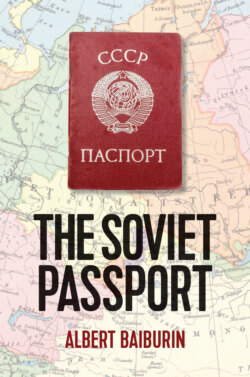Читать книгу The Soviet Passport - Albert Baiburin - Страница 13
Preface
ОглавлениеAs an anthropologist I have worked on a variety of subjects: semiotics of artefacts, rituals, stereotypical behaviour and now, suddenly, the passport. Actually, this is not as sudden as it may seem. The passport brings together in one object symbolism and ritualized practices; issues which have always interested me. Bureaucracy (especially Soviet bureaucracy) is perhaps the most ritualized area of any culture. Traditions in this area are especially rigid. Furthermore, I had to turn my attention to a completely different era, to principally different contexts and to unusual traditions of research.
It has always fascinated me that many people have a very particular, even a nervous, attitude to documents, and especially to the passport. How did this come about? How is it that documents have had such a strong effect on a person’s consciousness and attitude? And why did the passport become ‘the document above all documents’? It was in the Soviet period that the passport came to have a very special significance. Yet even I had not realized how many threads were drawn together by the Soviet passport. Herein lies the whole of Soviet history; the peculiarities of the Soviet person’s self-awareness; the life story of specific people; and much more besides. It was only after a number of years working in archives and libraries that I began to have a grasp of the subject; but even so I am still not absolutely convinced that I fully understand everything about the passport, so intricate and complicated is it.
I am very grateful to the Arts and Humanities Research Council (AHRC) for their support of my project from the outset. I am especially grateful to the Georgi Abdushelishvili Family Foundation for their permanent support of the Professorship in Everyday Soviet Life at the European University of St Petersburg, under the auspices of which work on this project continued.
Of enormous help to me were the comments and advice of Sergei Abashin, Alexander Chistikov, Catriona Kelly, Anna Kushkova, Georgi Levinton, Nikita Okhotin, Yuliya Orlova, Alexandra Piir, Konstantin Pozdnyakov, Arseniy Roginsky, Gabriel Superfin and Nikolai Vakhtin.
This book would not have been possible without access to material in a number of archives and museums. I should like to acknowledge the assistance provided by the staff of the State Archive of the Russian Federation (Moscow); the Russian State Archive of Social and Political History (Moscow); the Archive of the International ‘Memorial’ Society; the St Petersburg branch of the ‘Memorial’ Society; the Central State Archive of Cinematic and Photographic Documents in St Petersburg; the Museum of the Political History of Russia (St Petersburg); the State Museum of the History of St Petersburg; the Central State Historical Archive (St Petersburg); and the Archive of the Judaica Centre of the European University of St Petersburg.
I should like to express my sincere thanks to those who helped me to gather and transcribe the interviews: Alexandra Kasatkina, Catriona Kelly, Anna Kushkova, Maria Morozova, Irina Nazarova, Alexandra Piir and Darya Tereshina; as well as to those who shared with me their own interviews on a variety of topics: Maria Akhmetova, Svetlana Amosova, Marina Hakkarainen and Svetlana Sirotinina.
Whilst I was writing this book I was working in the Museum of Anthropology and Ethnography (the Kunstkamera), teaching in the Faculty of Anthropology of the European University of St Petersburg and producing the Anthropological Forum journal. I am very grateful to my colleagues in the Kunstkamera, the Faculty and the journal’s editorial board for the unfailing support I experienced throughout the whole period.
Finally, the author and the translator would like to give special thanks to Professor Catriona Kelly for her invaluable assistance.
Albert Baiburin
November 2020
